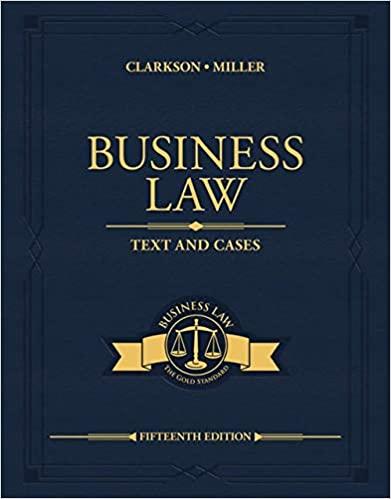Question
Crim 1115 - Fall 2023 - Assignments ASSIGNMENT 2 : 7% of Final Grade Detention or Not? Your textbook contains an In-Class Exercise at p100.
Crim 1115 - Fall 2023 - Assignments
ASSIGNMENT 2: 7% of Final Grade
Detention or Not?
Your textbook contains an In-Class Exercise at p100. I have built upon this assignment and changed it slightly. You need to complete it and submit it on BrightSpace.
The facts are as follows:
One rainy day John Smith is walking his dog one day when he is approached by a peace officer (let us call her Cst. Sanders), who tells Smith that the police are investigating a series of break-ins that occurred over the last week in the neighborhood. Smith is wearing a yellow baseball cap. Cst. Sanders has no idea what the offender looks like or whether he or she worked alone. She has no reason for believing that Smith was involved in the break-ins, but she asks Smith if he has seen anything unusual or suspicious. He is not sure if he must answer her question, but he reasonably believes that he should do so, to avoid looking suspicious, so he says No. 'Okay then, you may go,' Cst. Sanders says, and Smith walks away with his dog.
Just then another peace officer arrives in a cruiser. Her name is Cst. Levine. She has just learned that a neighborhood resident phoned in a general description of the suspect who was seen in the dark a couple of nights earlier. Among other things, the resident indicated that she had seen the suspect wearing what appeared to be a yellow baseball cap. Cst. Levine conveys this description to Cst. Sanders and Cst. Sanders realizes that the man she let go generally fits it. 'That guy I just spoke to could be him,' she tells Cst. Levine, so the officers catch up to Smith and Cst. Sanders says, 'Sir, if you don't mind, I'd like to speak to you again.'
Smith reasonably believes that he must speak to the officer again, especially because two officers are present now, so he stops and says, 'Okay. What is it?'
Cst. Levine says, "Well, sir. We have received information that the suspect in the break-ins fits your general description, your height and build, and most notably your yellow ball cap, so I would like to ask you some further questions, if you don't mind."
Questions (worth 9 points):
1) When Cst. Sanders first approached and spoke to Smith, did she detain him? If so, why?If not, why not? ___________________________________________________
__________________________________________________________________ (2)
2) If Cst. Sanders had detained Smith merely for questioning (investigative) purposes, did she do so lawfully? If so, why? If not, why not? __________________________
__________________________________________________________________ (2)
3) If Cst. Sanders had detained Smith for investigative purposes, was Cst. Sanders obliged to inform Smith of his right to counsel? Yes or No (1)
4) When Csts. Sanders and Levine next approached and spoke to Smith, did they detain him? If so, why?If not, why not? ___________________________________
__________________________________________________________________ (2)
5) If Cst. Levine had detained Smith when she told him about the information she had received, did she do so lawfully? If so, why? If not, why not? ___________________
__________________________________________________________________ (2)
The story continues.Cst. Levine asks Smith several questions:
Where do you live? (A: Not from around here).
What is your job? (A: Unemployed)
Do you often wear that baseball hat? (A: Yes)
Do you have any identification? (Yes)
May I see it? Smith shows Cst. Levine his driver's licence.
Cst. Levine hands it to Cst. Sanders, who keys in the information in her police database and discovers that Smith has an old criminal record for theft under $500. This fact heightens Cst. Sanders' and Cst. Levine's suspicions that Smith did the break-ins.
Cst. Levine does not yet warn Smith that what he says might be used against him and she does not yet provide Smith with his right to counsel. Instead, she asks him a few more questions, which he reasonably feels compelled to answer. He tells Cst. Levine a couple of lies but his lies suggest that he was responsible for the break-ins. In other words, Smith does not know it, but his answers to Cst. Levine are self-incriminating. They suggestively amount to a confession.
So, Cst. Levine says to Smith, 'I hate to say this, Mr. Smith, but I believe that you are responsible for the break-ins we are investigating. You need not say anything further to me or my partner. Anything you do say may be used as evidence against you and you have a right to speak to a lawyer without delay.'
More Questions (worth 4 points):
1) Assuming that Smith confessed to Cst. Levine, identify one basis on which he could argue that he confessed involuntarily. ______________________________________
__________________________________________________________________ (1)
2) If Smith confessed involuntarily to Cst. Levine, could it be admissible against him in evidence? Yes or No (1)
3) Assume that Smith wishes to get his confession excluded from evidence at his breaking & entering trial, so he argues that Cst. Levine did not give him his right to counsel as required by s.10 of the Charter. State one reason why his argument is compelling? _________________________________________________________ (1)
4) Assume that the trial judge must apply s.24(2) of the Charter to Smith's confession. The trial judge must then exclude Smith's confession under what condition or circumstances? ________________________________________________________
___________________________________________________________________ (1)
Step by Step Solution
There are 3 Steps involved in it
Step: 1

Get Instant Access to Expert-Tailored Solutions
See step-by-step solutions with expert insights and AI powered tools for academic success
Step: 2

Step: 3

Ace Your Homework with AI
Get the answers you need in no time with our AI-driven, step-by-step assistance
Get Started


